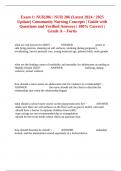Exam (elaborations)
Exam 1: NUR206 / NUR 206 (Latest 2024 / 2025 Update) Community Nursing Concepts | Guide with Questions and Verified Answers | 100% Correct | Grade A – Fortis
- Course
- NUR206
- Institution
- Fortis College Of Nursing
Exam 1: NUR206 / NUR 206 (Latest 2024 / 2025 Update) Community Nursing Concepts | Guide with Questions and Verified Answers | 100% Correct | Grade A – Fortis
[Show more]



